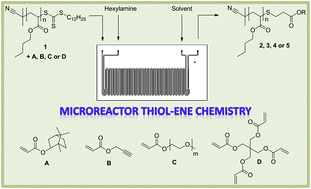Use of a continuous-flow microreactor for thiol–ene functionalization of RAFT-derived poly(butyl acrylate)†
Abstract
This study describes the synthesis of functionalized RAFT-derived poly(n-butyl acrylate)

* Corresponding authors
a
Polymer Reaction Design Group, Institute for Materials Research (IMO), Universiteit Hasselt, Agoralaan Building D, B-3590 Diepenbeek, Belgium
E-mail:
tanja.junkers@uhasselt.be
Fax: +32 11 268399
Tel: +32 11 268318
This study describes the synthesis of functionalized RAFT-derived poly(n-butyl acrylate)

 Please wait while we load your content...
Something went wrong. Try again?
Please wait while we load your content...
Something went wrong. Try again?
J. Vandenbergh and T. Junkers, Polym. Chem., 2012, 3, 2739 DOI: 10.1039/C2PY20423A
To request permission to reproduce material from this article, please go to the Copyright Clearance Center request page.
If you are an author contributing to an RSC publication, you do not need to request permission provided correct acknowledgement is given.
If you are the author of this article, you do not need to request permission to reproduce figures and diagrams provided correct acknowledgement is given. If you want to reproduce the whole article in a third-party publication (excluding your thesis/dissertation for which permission is not required) please go to the Copyright Clearance Center request page.
Read more about how to correctly acknowledge RSC content.
 Fetching data from CrossRef.
Fetching data from CrossRef.
This may take some time to load.
Loading related content
